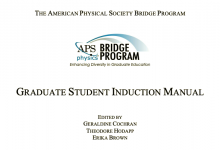Resource Library
Last updated: May 2, 2025
IGEN and our partners are developing and collecting resources to support individuals and institutions that are interested in graduate education.
- Workshop
Getting Ready For Advanced Degrees (GRAD) Lab
Details
The National GEM Consortium’s, GRAD Lab offers underrepresented students exposure to the benefits of research and technology careers in a highly interactive one-day event.
Speakers may range from current graduate students to senior managers to faculty and senior administrators. They are selected from diverse communities and disciplines to present on the following topics:
- “Why Graduate School”
- “How to Prepare for Graduate School”
- “Understanding the GEM Fellowship”, and
- “Voices From the Field: Real Life Research and Internship Experiences”
GRAD Lab encourages young people of color to consider graduate engineering or science education and applying for the GEM fellowship. Focusing on the global importance of research and innovation, life-long career benefits, and real world role models the symposium will help each student envision his or her future as a technology leader, successfully apply for a GEM fellowship, and gain entry to a graduate program. GRAD Lab is GEM’s portable and scalable solution for developing diverse technical talent with advanced degrees.
- Website
Pathways To Science Resource Toolbox
Details
The Pathways to Science Resource Toolbox has many resources to support students as they prepare for and apply to graduate school. Students will find great suggestions for preparing their applications and faculty & staff will resources to help them be better support their students.
- Website
myIDP: Individual Development Plan
Details
The Individual Development Plan (IDP) concept is commonly used in industry to help employees define and pursue their career goals.
myIDP provides:
- Exercises to help you examine your skills, interests, and values
- A list of 20 scientific career paths with a prediction of which ones best fit your skills and interests
- A tool for setting strategic goals for the coming year, with optional reminders to keep you on track
- Articles and resources to guide you through the process
To learn more about the value of IDPs for scientists, read the first article in our myIDP series.
- Website
Planning for Graduate Work
Details
Successfully preparing for, finding, and transitioning into a graduate program requires an investment of time and effort. Central to this process is the on-going consideration of your goals, strengths, and opportunities. The contacts in your network will also provide information, advice, and support. Remember that great resources for learning about graduate school are undergraduate advisers, graduate faculty, and graduate school events held as part of undergraduate programming at ACS meetings.
- Guide
Graduate School Reality Check
Details
If you’re considering graduate school, there is a lot you can do to ensure your success... and it’s never too early to start. Most important is completing a rigorous undergraduate curriculum, such as one that meets the requirements of an ACS-certified degree. Since chemistry research is becoming increasingly interdisciplinary, taking electives in other scientific areas of interest can be good preparation for interdisciplinary graduate work.
- Workshop
Fostering Well-being
Details
Research has shown that students struggle with mental health issues such as anxiety and depression at higher rates than the general population. While some stress and uncertainty is unavoidable in training, research mentors can have a direct impact on the well-being of members of their research group. By recognizing how usual norms and practices in the academy create environments that can undermine wellbeing, particularly for minoritized students, we can become more thoughtful about the impact of our own behavior in as mentors-- and begin to foster research and learning environments that support well-being. This workshop will also encourage discussion about how mentoring can positively and negatively impact mentees’ sense of autonomy, competence, personal growth, and belonging. Developing the skills to have open conversations about the often stigmatized topics of mental health well-being is key to this process.
- Workshop
Fundamentals: Equity in Graduate Admissions
Details
This workshop presents data and research about the role of typical admissions criteria and practices in maintaining racial/ethnic inequalities in graduate education. Suitable for a wide variety of audiences, practical strategies for rethinking typical admissions criteria and processes are introduced, with a focus on equity-based holistic review and embedding attention to equity throughout the admissions and recruitment process. All aspects of this session are rooted in current research. Participants will learn how common admissions mindsets & practices tend to inhibit access for underrepresented groups, and they will be introduced to strategies to improve diversity & equity through holistic review processes.
- Book
Equity in Science: Representation, Culture, and the Dynamics of Change in Graduate Education
Details
STEM disciplines are believed to be founded on the idea of meritocracy; recognition earned by the value of the data, which is objective. Such disciplinary cultures resist concerns about implicit or structural biases, and yet, year after year, scientists observe persistent gender and racial inequalities in their labs, departments, and programs. In Equity in Science, Julie Posselt makes the case that understanding how field-specific cultures develop is a crucial step for bringing about real change. She does this by examining existing equity, diversity, and inclusion efforts across astronomy, physics, chemistry, geology, and psychology. These ethnographic case studies reveal the subtle ways that exclusion and power operate in scientific organizations and, sometimes, within change efforts themselves. Posselt argues that accelerating the movement for inclusion in science requires more effective collaboration across boundaries that typically separate people and scholars—across the social and natural sciences, across the faculty-student-administrator roles, and across race, gender, and other social identities. Ultimately this book is a call for academia to place equal value on expertise, and on those who do the work of cultural translation. Posselt closes with targeted recommendations for individuals, departments, and disciplinary societies for creating systemic, sustainable change.
- Newsletter
IGEN Quarterly Update – Fall 2018
Details
Our IGEN Project Quarterly Report highlights the work being done by our alliance members and partners.
Featured in this issue:
- The Vision and Goals of NSF Includes: IGEN
- Building the IGEN Community (Goal 4)
- Catalyzing the Adoption of Inclusive Practices (Goal 2)
- Conducting Research and Propagating Results (Goal 3)
- Increasing Participation of UREM Students (Goal 1)
- IGEN Project Summary
- Newsletter
IGEN Quarterly Update – Winter 2019
Details
Our IGEN Project Quarterly Report highlights the work being done by our alliance members and partners.
Featured in this issue:
- Building the IGEN Community (Goal 4)
- Catalyzing the Adoption of Inclusive Practices (Goal 2)
- Conducting Research and Propagating Results (Goal 3)
- Increasing Participation of UREM Students (Goal 1)
- IGEN Project Summary
- Avenues for Collaboration between IGEN and Aspire
- Newsletter
IGEN Quarterly Update – Spring 2019
Details
Our IGEN Project Quarterly Report highlights the work being done by our alliance members and partners.
Featured in this issue:
- Building the IGEN Community (Goal 4)
- Catalyzing the Adoption of Inclusive Practices (Goal 2)
- Conducting Research and Propagating Results (Goal 3)
- Increasing Participation of UREM Students (Goal 1)
- IGEN Project Summary
- Article
Posselt Helps Chart the Future of Equity in Astronomy on NASEM Committee
Details
The Pullias Center’s Julie Posselt serves as a member of The National Academies of Science "Panel on the State of the Profession and Societal Impacts" in Astronomy and Astrophysics that generate a comprehensive strategy and vision for the next decade of science in astronomy and astrophysics.
- Article
Posselt and Team Author Chapter on Evaluation and Decision-Making in Higher Education
Details
What are the hidden rules and practices that affect who gets respect and opportunities in higher education? How can we reconstruct these rules to encourage equity in the system? A new chapter in the Higher Education: Handbook of Theory and Research book series by Julie Posselt and a team at the Pullias Center takes a hard look at these fundamental questions and suggests how evaluation and decision making can be leveraged for equity.
- Article
Pullias Team Addresses Biases and Discrimination Hiding in Letters of Recommendation
Details
The Pullias Center’s Julie Posselt, Steve Desir, and Román Liera are leading an effort to shine a light on this typically unrecognized source of bias that has the power to shape the careers of graduates and other applicants looking to enter or advance in the workforce. Letters of recommendation are used in admissions and hiring to glean information and qualities which may go unnoticed in the review of an applicant’s file. However, they are also one of the most common places that bias is written into applicant records– sometimes in subtle ways.
- Newsletter
IGEN News Fall 2019
Details
Our IGEN Project Quarterly Newsletter highlights the work being done by our alliance members and partners.
Featured in this issue:
- A preview to the 2019 IGEN National Meeting
- Growing Academic Partnerships!
- Research & Inclusive Practices
- Newsletter
IGEN News Summer 2020
Details
Our IGEN Project Quarterly Newsletter highlights the work being done by our alliance members and partners.
Featured in this issue:
- New Professional Networking Group
- Workshops and Resources for Equity in Graduate Admissions
- Disciplinary Partner Updates
- Website
Equity in Graduate Education Curated Library
Details
Selected research curated to foster learning and adoption of inclusive practices in graduate education.
- Guide
APS Bridge Program Induction Manual
Details
The APS Bridge Program Student Induction Manual documents effective practices for inducting new students into graduate programs, as identified and described by APS Bridge Sites. It also includes specific strategies for developing a solid foundation for students before and well after their arrival on campus.
- Workshop
Equity in Graduate Education Virtual Journal Club
Details
These quarterly gatherings break down research studies and social theories that are relevant to equity in graduate education, with attention to practical implications.
- Workshop
Facilitator Training for Admissions Workshops
Details
OVERVIEW & GOALS
- Preparing higher education change agents to facilitate interactive workshops on holistic graduate admissions.
- Faculty and administrators with an interest in improving graduate education in STEM, and without competing financial interests, are welcome to apply.
- Preference will be given to applicants who are faculty in the physical or social sciences and who have with demonstrated effort increasing diversity, equity, and inclusion in doctoral education.
- Website
ChemIDP: ACS's Career Planning Tool
Details
ChemIDP is an Individual Development Plan designed specifically for graduate students and postdoctoral scholars in the chemical sciences. Through immersive, self-paced activities, users explore potential careers, determine specific skills needed for success, and develop plans to achieve professional goals. ChemIDP tracks user progress and input, providing tips and strategies to complete goals and guide career exploration.
- Workshop
Learn to Implement Mentor Training
Details
The Facilitator Workshop: Learn to Implement Mentor Training is a two-day workshop designed to increase the capacity for research mentor trainings offered at colleges and universities, research institutes, and organizations.
During this workshop, participants are introduced to the Entering Mentoring curricula, which addresses the following themes: aligning expectations, addressing equity and inclusion, articulating your mentoring philosophy and plan, assessing understanding, cultivating ethical behavior, enhancing work-life integration, fostering independence, maintaining effective communication, and promoting professional development. Workshop participants become familiar with the curricula, practice facilitating training components, and develop a plan for implementing the training at their institution or organization.
- Presentation Materials
Creating our Future: Attracting and Retaining the Best Students from all Backgrounds
Details
Presentation on how Physical Sciences Bridge Programs affected the participation rates of Underrepresented Minority (URM) in graduate degree programs.
- Presentation Materials
APS Bridge Program: Changing the Face of Physics / IGEN: Bridge Program – TNG
Details
Biases, conscious or unconscious, are learned social stereotypes that have real effects in the workplace. This series explores individual, organizational and societal factors that influence the intersection of diversity, equity and inclusion. Participants will be challenged to examine their actions and inactions. This series is designed to provide practical tools and resources that interrupt bias and promote workplace inclusion.
- Presentation Materials
Mental Health in Graduate Education: What Faculty, Friends, and Family Can Do
Details
Stories and statistics abound about the struggles of graduate education and the risks for wellbeing that it poses to students. In this plenary, we’ll explore both root causes of mental illness among today’s generation of graduate students, the unique barriers experienced by members of minoritized communities, as well as the proactive steps that faculty, friends, and family can take to provide support and challenge toxic norms within academia. Posselt will present research completed through a two year National Academy of Education fellowship on graduate student mental health, sharing findings from two studies: 1) A large-scale national analysis of 20,000 students’ views on competition, discrimination, and support in relation to depression and anxiety, and 2) A qualitative study of the ways that doctoral students of color within STEM conceptualize faculty support.
- Blog Post
To GRE or not to GRE: FAQ
Details
Frequently asked questions regarding GRE and Graduate Admissions Like you, I’ve struggled with what to use for graduate admission criteria in the Geosciences. A little over a year ago, I intended to write about why we should use the GRE for admissions, but the more I read, the more I decided it was a flawed measure. Since writing my post, To GRE or not to GRE, I’ve received several questions that I’d like to respond to here, publicly. Given that COVID -19 has drastically changed testing, I also discuss that.
- Article
Genentech Foundation provides $3 million grant to ACS Bridge Project
Details
The Genentech Foundation has provided support to the ACS Bridge Program.
- Article
AGU’s Bridge Program Creates Opportunities for Underrepresented Students
Details
In its first year, 20% of the 250 active Earth and space science graduate programs in the United States applied for partnership with the program.
- Article
ACS Bridge Project: A game changer for the chemical enterprise
Details
Underrepresented minority students make up a third of college-age US citizens and earn roughly 18% of US chemistry bachelor’s degrees and 11% of chemistry PhDs, according to data from the National Center for Education Statistics’ Integrated Postsecondary Education Data System.
- Article
Why meritocracy is a myth in college admissions
Details
Even if wealthy parents don't resort to the kind of illegal tactics in the recent college cheating scandal revealed by the FBI, the college admission process still favors the rich, scholars argue.
- Article
To GRE or not to GRE
Details
...The data shows that the GRE gives us no predictive information on who will succeed in graduate school (even among men) and simultaneously acts to weed out people of color and underrepresented minorities and, as a whole, doesn’t help women applicants either.
© 2019 SPEAKING OF GEOSCIENCE
- Article
AGU Joins Partnership to Build Greater Diversity and Inclusion in the Physical Sciences
Details
...AGU is one of five scientific societies that have formed the Inclusive Graduate Education Network (IGEN), which will increase the participation of women and underrepresented racial and ethnic minorities in graduate studies in the physical sciences.
- Journal Article
Framing Diversity: Examining the Place of Race in Institutional Policy and Practice Post-Affirmative Action
Details
Abstract
The University of Georgia has operated under a voluntary “race-neutral” admission policy for the past 2 decades. Using frame analysis theory, we examine university documents and interview data from 11 campus administrators responsible for diversity efforts to understand how diversity is framed at the institutional and individual levels post-affirmative action. We compare our findings to the broader sociolegal discourses around diversity to present points of convergence and divergence among frames. We find official university framing of diversity has broadened over time to include numerous characteristics, while administrators hold divergent frames depending on their functional area, philosophy, and personal experience. We conclude that divergent frames may reflect and contribute to the challenge of advancing a coherent set of diversity efforts in a post-affirmative action context, where the place of race in institutional policy is muted. As more institutions consider admissions policy devoid of race to avoid protracted legal struggles, it may be especially important for institutions and administrators responsible for diversity efforts to be explicit with one another and with those whom they hire about how they will continue seeking racial equity.
- Book
Higher Education Administration for Social Justice and Equity - Critical Perspectives for Leadership
Details
Abstract
Higher Education Administration for Social Justice and Equity empowers all administrators in higher education to engage in their work—to make decisions, hire, mentor, budget, create plans, and carry out other day-to-day operations—with a clear commitment to justice, sensitivity to power and privilege, and capacity to facilitate equitable outcomes. Grounding administration for social justice as a matter of daily work, this book translates abstract concepts and theory into the work of hiring, socialization, budgeting, and decision-making. Contributed chapters by renowned scholars and current practitioners examine the way higher education administration is organized, and will help readers both question existing structures and practices, and consider new and different ways of organizing campuses based on equity and social justice. Rich with case studies and pedagogical tools, this book connects theory to practice, and is an invaluable resource for current and aspiring administrators.
- Article
Julie Posselt: System Shocks and Institutional Change
Details
Abstract
Change comes slowly in higher education, or so the best theory and evidence say. Yet there are exceptions to every rule, and exogenous shocks such as protests, wars, natural disasters and, as we are now seeing, a global pandemic can compel decisive, transformational changes that colleges, universities, and their members would otherwise resist.
- Article
What NSF’s new diversity grants say about attempts to help minority students
Details
INCLUDES Alliance awards fund partnerships across higher education
- Article
Network forms to bolster equity in STEM graduate education
Details
The initiative brings together USC Rossier and more than two dozen other organizations.
- Newsletter
IGEN News Spring 2020
Details
Our IGEN Project Quarterly Newsletter highlights the work being done by our alliance members and partners.
Featured in this issue:
- Supporting Graduate Student Well-Being
- IGEN Bridge Application
- Partner Updates
- Equity in Graduate Admissions
- Newsletter
IGEN News Winter 2020
Details
Our IGEN Project Quarterly Newsletter highlights the most impactful work being done by our alliance members and partners.
Featured in this issue:
- IGEN 2019 National Meeting
- Partner Spotlight
- Collective Activities
- Article
US societies join forces in $10m drive to tackle diversity
Details
New programme aims to boost the number of women and underrepresented racial and ethnic minorities in science
- Article
Hope prof receives grant to bolster physical science enrollment
- Presentation Materials
Practicing Equitable Admissions through Holistic Review
Details
This presentation will draw from a decade of research that 1) critically analyzes common systems of admission to doctoral programs and 2) develops a case for holistic review, including caveats about design and implementation. Dr. Posselt will present admissions from decision makers' point of view, including thought-provoking episodes of committees grappling with borderline cases. To promote equity, transparency, and legal safeguards, Posselt shares concrete strategies and places admissions within a system of practices that collectively shape student and program outcomes.
- Website
Kognito
Details
A set of role-play, avatar modules to educate faculty, staff, and students about mental health and suicide prevention.
- Presentation Materials
Preparing Graduate Admissions & Recruitment for Effects of COVID-19
Details
Presentation addressing recruitment and admissions challenges facing graduate education in light of COVID-19. The panelists will present research and institutional responses that, together, highlight paths for administrators and faculty toward equitable enrollment management. How should we communicate with incoming and prospective students given universities’ quickly changing policy landscape? How can we design holistic review processes that account for new variations in applicant grades, experiences, and obstacles during this time?
- Report
Webinar Report: Effects of COVID-19
Details
Crises are moments for culture building. During this time we are learning that connections, communication, and critical conversations matter more than ever. As we think about preparing our institutions for annual graduate admissions and recruitment processes, awareness about our respective institutional contexts and individual identities matter. Context and identity matter on their own, and they matter in combination by affecting the resources likely available to us, the constraints and norms we are more likely to face, and the networks of which we are part.
- Presentation Materials
Equity in Graduate Admissions
Details
Webinar and discussion session presenting data and research about the role of typical admissions criteria and practices in maintaining racial/ethnic inequalities in graduate education. Practical strategies for rethinking typical admissions criteria and processes are introduced, with a focus on equity-based holistic review and embedding attention to equity throughout the admissions and recruitment process.
- Presentation Materials
Inclusive Graduate Education Network Data
Details
Current Data to support the charge of the IGEN Project and its measured success.
- Presentation Materials
Inclusive Graduate Education Network: Project Overview
Details
Presentation on how Physical Sciences Bridge Programs affected the participation rates of Underrepresented Minority (URM) in graduate degree programs.
- Presentation Materials
Impact of the NSF INCLUDES Alliance Inclusive Graduate Education Network (IGEN)
Details
Conference poster.
- Presentation Materials
Inclusion, Diversity and Innovation
Details
Presentation on the benefits of diverse leadership in business and how IGEN goals look to increase the participation gap.

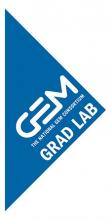


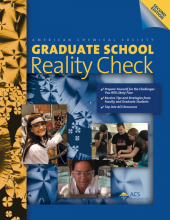 Published in Graduate School Reality Check Second Edition,
Published in Graduate School Reality Check Second Edition,
 Published in Equity in Graduate Education Workshops,
Published in Equity in Graduate Education Workshops,
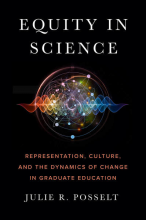 Published in Stanford University Press, 2020-09
Published in Stanford University Press, 2020-09
 Published in IGEN Newsletters, 2019-05
Published in IGEN Newsletters, 2019-05
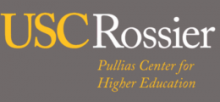 Published in Pullias News , 2020-03
Published in Pullias News , 2020-03
 Published in IGEN Newsletters, 2019-11
Published in IGEN Newsletters, 2019-11
